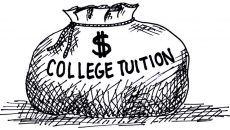(Photo Courtesy of WYPR) “Jonathan Lemire is the author of the New York Times Bestseller “The Big Lie.””
Qinglong Diep
Connector Staff
In a forum organized jointly with Learning in Retirement Association (LIRA) and UMass Lowell, the conversation moderated by John Cluverius of the Political Science department focuses on Jonathan Lemire’s newest book titled The Big Lie: Election Chaos, Political Opportunism, and the State of American Politics After 2020 that just came out in July 2022.
Jonathan Lemire is a Lowell native that grew up in Pawtucketville. He set several track records at Central Catholic High School. He is the White House Bureau Chief for Politico and host of “Way Too Early” on MSNBC. He occasionally makes appearances on “Morning Joe” on MSNBC. Before joining Politico, he worked at the New York Daily News and the Associated Press.
According to Dr. Cluverius, the purpose of having this conversation with him about his book was to engage the audience of what happened after the 2020 election, but also discuss what the big lie was.
Cluverius begins by asking Lemire to tell the audience what the big lie is. Lemire responded to the question by beginning that Trump would lie about things that are either big or small at any time. He also mentioned that the word “lie” is something that journalists had to get used to saying as the media was challenged to conduct fact checking and calling out things that were not true that were said by Trump publicly or by official statements from the White House.
“This lie, though, is his biggest and most damaging, it tested the very tenet of our democracy. If you boil down what makes America different then so many other countries‘ democracy, many historians would say – the reason is the peaceful transfer of power..” said Lemire. He also talked about the conspiracy theories that former president Trump made which eventually led that Trump’s words “inspired violence at the very simple of our democracy and did nothing to stop it.”
Cluverius then asks Lemire why voters were keen to accept a lie that was not true. Lemire begins his response to the question by saying that according to political scientists this trend began before Trump in the 1980s. “And that Trump saw this, split tribes, tribalism, team red, team blue. And we now live in an age where there’s increased political polarization in part because of how we communicate each other, how we talk to each other, which we mainly don’t. And it’s so easy now to be siloed just in your own ecosystem, media ecosystem.”
Cluverius later points out Biden’s struggle and ask Lemire a question on how is operating in a post-Trump world affecting the Biden-Harris administration’s own political competency. Lemire says that Trump’s grip on the Republican party would end when Trump left office and that it would return back to normal how Biden remembered it when he was in the Senate. However, he said that this was not the case when Biden and Harris took office at all as there was some fierce resistance from the Republican Party with a few exceptions of bipartisan accomplishments such as the infrastructure bill passed around a year ago.
Eventually, Cluverius then asks Lemire a question regarding about what happened in Helsinki, Finland to “color his attitude around the 2020 election.” Lemire responds by saying that one of Trump’s legacies during his time in office was to “undermine American’s faith in institutions,” Some of those institutions would be the U.S. government, federal law enforcement, health agencies and more.
“But it showed a blatant disregard for the American institutions and the democracy itself, where he’s willing to entertain these things. And that’s a natural evolution of that was pushing people in his government, including the Department of Justice, to try to investigate and overturn the election results” said Lemire.
Finally a question from Cluverius that was about what advice he would give to high school and college students that he wished he knew when he started journalism. “It’s about talking to people. It’s about asking questions. It’s about listening to the answers.”




